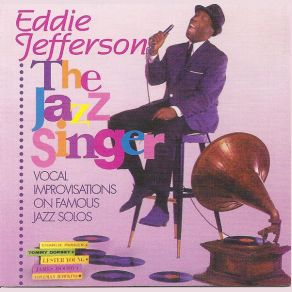The Jazz Singer
Download links and information about The Jazz Singer by Eddie Jefferson. This album was released in 1965 and it belongs to Jazz, Vocal Jazz, Classical, Bop genres. It contains 18 tracks with total duration of 53:35 minutes.

|
|
|---|---|
| Artist: | Eddie Jefferson |
| Release date: | 1965 |
| Genre: | Jazz, Vocal Jazz, Classical, Bop |
| Tracks: | 18 |
| Duration: | 53:35 |
| Buy it NOW at: | |
| Buy on iTunes $9.99 | |
| Buy on iTunes $9.99 | |
| Buy on iTunes 0 | |
Tracks
[Edit]| No. | Title | Length |
|---|---|---|
| 1. | So What | 3:30 |
| 2. | Moody's Mood for Love | 3:10 |
| 3. | Sister Sadie | 2:44 |
| 4. | Lester's Trip to the Moon (Paper Moon) | 3:03 |
| 5. | T.D.'s Boogie Woogie | 2:26 |
| 6. | Now's the Time | 3:01 |
| 7. | Body and Soul | 3:33 |
| 8. | Workshop | 2:57 |
| 9. | Sherry | 3:04 |
| 10. | Baby Girl (These Foolish Things) | 3:18 |
| 11. | Memphis | 2:52 |
| 12. | Honeysuckle Rose | 2:18 |
| 13. | A Crazy Romance (The Preacher) | 2:27 |
| 14. | Night Train | 2:34 |
| 15. | Nur (I'm Gone) | 3:18 |
| 16. | I've Got the Blues (Lester Leaps In) | 2:41 |
| 17. | Silly Little Cynthia | 1:57 |
| 18. | Red's New Dream | 4:42 |
Details
[Edit]Eddie Jefferson, one of the great jazz singers and an important pioneer of vocalese, is heard in peak form on this Evidence CD which reissues an Inner City LP and adds six previously unissued selections to the program. The bulk of the music is from 1959-1961, with Jefferson backed by several horns including trumpeter Howard McGhee and tenor saxophonist James Moody, and sometimes three other vocalists. There are many highlights including Jefferson's original classic versions of "Body and Soul" (a tribute to Coleman Hawkins, the "king of the saxophone") and "So What" (dedicated to Miles Davis), a remake of "Moody's Mood for Love" and vocalese adaptations of a few Lester Young and Charlie Parker solos. Most of the unissued tracks are from these sessions, but there is also "Silly Little Cynthia" from 1964 (a duet with pianist Tommy Tucker) and a meeting with guitarist Louisiana Red on 1965's "Red's New Dream." When one considers that Jefferson otherwise did not record during 1963-1967, it makes those two numbers not only enjoyable but historic. This CD is highly recommended for all jazz collections.